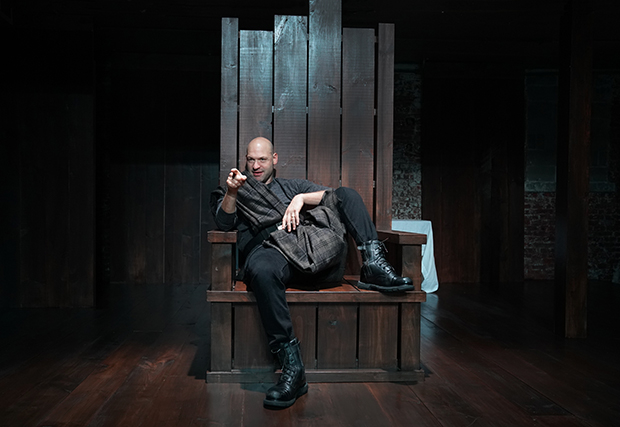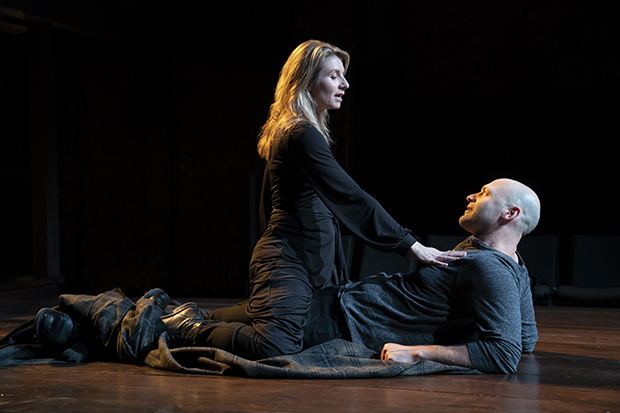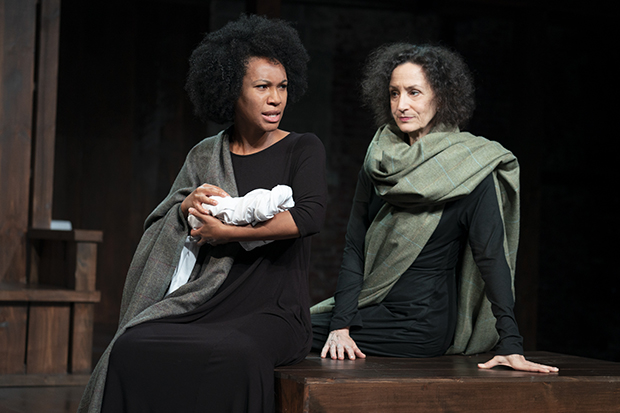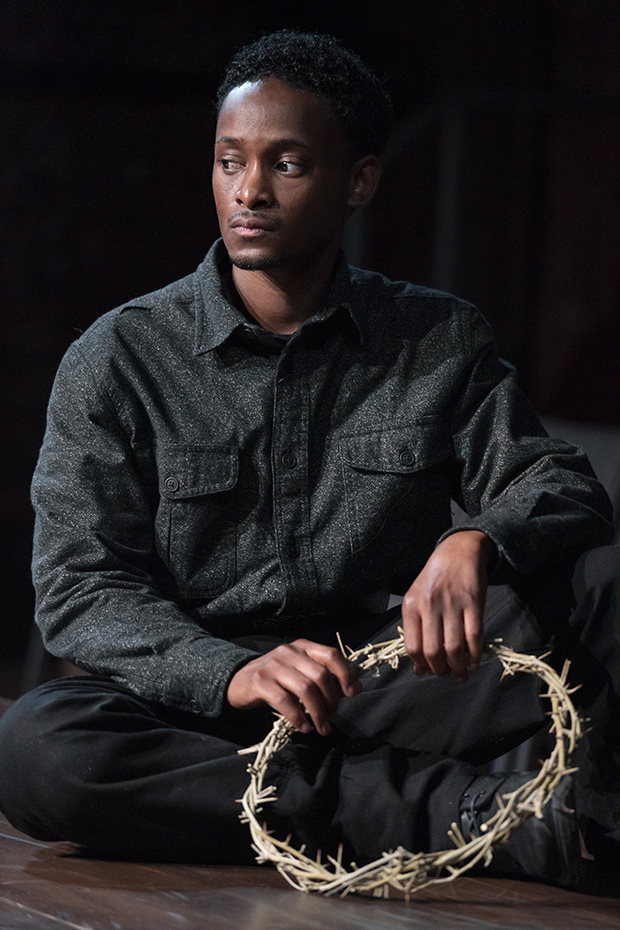Corey Stoll Is a Modern Macbeth in a Medieval World
Classic Stage Company mounts a revival of the Scottish play.

(© Joan Marcus)
A bunch of witches run the show over at Classic Stage Company. That show is William Shakespeare's occult tragedy Macbeth, which is now performing in a zippy staging from director John Doyle, just in time for Halloween. In this production, the witches are indeed in charge — and there aren't just three. The entire cast seems to be in on the spell, incanting their hurly-burly lines as a chorus, and then stepping into name parts as required (most of the actors play multiple parts in this pared-down production). They perch upstage and watch over the proceedings like solemn owls on the lookout for a rodent. Who could that be?
It's our title character, of course: Macbeth (Corey Stoll) is the Thane of Glamis, a sleepy Scottish backwater. But when he triumphs over an army of invading Norwegians, allied with the perfidious Thane of Cawdor, King Duncan (Mary Beth Piel) resolves to award Macbeth with Cawdor's seat. Macbeth receives this news before the king ever tells him, because he and his buddy, Banquo (Erik Lochtefeld) encounter a coven of witches that can see the future. Their prophecies go further: Macbeth will someday be king, and Banquo's descendants will also be kings. But what of Duncan, who is presently king and very much alive? Macbeth's ambitious wife (Nadia Bowers) has a plan for him.

(© Joan Marcus)
Stoll has become a familiar face at Shakespeare in the Park, where he has been instrumental in bringing Shakespeare's plays into a modern context: His Ulysses in Troilus and Cressida seemed to emerge straight out of Halliburton corporate headquarters, and his Iago was a wheedling spin-artist for the post-truth era. His made-for-Netflix mannerisms fit less comfortably on the Thane of Glamis, who is more McKinsey than Macbeth in this presentation. Certainly, he plays against Doyle's design, which presents a medieval world crafted in wood, adorned in wool, and defended by steel.
This Mac has a fitting mate in Bowers's Lady (the two are married in real life): "That which have made them drunk hath made me bold," she says with the swagger of a cable news talking head bragging how she drinks all the boys under the table. We can easily imagine these two attending a $1,000-a-plate SuperPac gala, which is essentially how the banquet scene is played — and it's hilarious (much more so than its uptown counterpart in Scotland, PA). Does it fit in Doyle's production? Not really, but we're glad for the comic relief, especially since the director has excised the porter (the clownish doorman who usually breaks up the drama with a funny monologue).

(© Joan Marcus)
N'Jameh Camara's brief appearance as Lady Macduff is the performance I'll most remember from this production: She's an honest woman attempting to raise a child in a world in which all morals are now negotiable, and the terror of that reads in her stony gaze. Many mothers in the audience will doubtlessly relate.
Doyle's staging has its peaks and valleys. His concepts for certain scenes (like the second prophecy, which takes the form of a black mass) are much stronger than others: The long scene between Duncan's son Malcolm (Raffi Barsoumian) and loyalist Macduff (Barzin Akhavan) feels like shapeless filler, rather than the essential turning-point that it is.
Still, Doyle has smartly shaved down the script to an essential 100 minutes, with the action of each scene bleeding into the next so there is no dead air onstage. Sound designer Matt Stine delineates the borders between early scenes with thunderclaps, which eventually disappear so that all we are left with is the hum of the witches underscoring Macbeth's soliloquys. Lighting designer Solomon Weisbard takes advantage of the considerable height of the theater, illuminating the ceiling to turn Classic Stage into a medieval great hall. Altogether, it is the kind of smart, efficient design that Doyle does best.
In his collaboration with trusty costume designer Ann Hould-Ward, Doyle crafts his most compelling story arc: All of the actors wear heavy wool cloaks at the top of the show, their tartan patterns scarcely visible (spare the one worn by Macbeth). As the show progresses, the performers shed their cloaks in favor of the simple black garments underneath, until the only tartan visible is the one Macbeth has hung over his throne like a banner. By the very end of the play, as the age of thanes passes into the age of earls, I wondered if these Scots had traded the thing that made them distinct for dull, colorless cosmopolitanism. Rather than being the most modern figure onstage, Macbeth actually feels like the last man standing in the way of the steamroller of progress.

(© Joan Marcus)









